
Atlas F1 GP Correspondent
Paul Stoddart faced one of the fiercest battles of his business career this year, when he confronted the F1 establishment over $12 million TV money. Team owners often squabble, but rarely do they do it with such strident resonance as Stoddart had done - recruiting the media, some of the team owners and the fans in the process. Stoddart won that battle, but he still has to win the war - securing his team's future - and with just a few less friends in the paddock and just a few more disgruntled sponsors, the Australian may just face tougher battles ahead. Jane Nottage sat down with the energetic team owner, and she brings more information and a few unknown facts about the Australian Warrior. Exclusive for Atlas F1
A prolonged bout of infighting broke out among the teams, with some team owners - notably Falvio Briatore of Renault, Niki Lauda of Jaguar, Ove Andersson of Toyota (who had no financial interest in the matter, as Toyota didn't compete in the 2001 World Championship), Jean Todt of Ferrari and Peter Sauber of Sauber - supporting Stoddart.
In the case of Briatore and Lauda, their reasoning was that the whole argument was simply a waste of time and effort when, in their opinion, there were far more weighty matters to consider, not to mention the fact that all this infighting would just do further damage to a sport that was facing a few ups and downs in the face of a worldwide economic crisis.
In fact, at Silverstone, the normally reticent Briatore expressed concern to Atlas F1 about the image portrayed by the Arrows 'racing or not' crisis that hit the Formula One world on the eve of the British Grand Prix. "Formula One does not need this type of controversy," the Italian said. Added to that, Jean Todt and Peter Sauber clearly understood that legal opinion was stacked on Minardi's side, while Ove Andersson was also on the side of the righteous.
On the other end of the rink, however, stood Tom Walkinshaw of Arrows, Ron Dennis of McLaren, and Eddie Jordan of Jordan, all insisting that the money should be divided up amongst the other nine teams, with Minardi receiving not a penny of the reputed $12 million dollars due to them.
Jordan has been facing his own crisis and was not going to relinquish a possible additional income without a fight; Dennis was against it, stating he "believes strongly that Minardi has no legal right to the funds they claim they have rights to"; and Walkinshaw was making his own declarations in the fight at the bottom of the grid.
Either way, however, it was clear to all that not receiving this money would have been a disaster for Stoddart, who admitted earlier in the year that he could not afford to continue to run Minardi if he didn't get the TV money. And so begun the fight, and it has been a long and bitter one with feelings running high and wounds running deep. And, even though the feud has been settled, the residual wounds aren't going to heal very quickly.
Like all his previous business dealings, Stoddart expected Formula One to be straightforward and financially uncomplicated - you agreed a price and you got the goods. But Formula One, as he soon found out, runs along the line of a Machiavellian Italian kingdom, and all the little Princes and Dukes are keen in protecting their interests and are wary of outsiders, particularly bright, breezy, down to earth, loud-mouthed Aussies. They would take his money, but at a price.
He initially dipped his toe in the water with Tyrell, sponsoring the team in 1996 and 1997 before making a bid for it at the Spanish Grand Prix in Barcelona in May 1997. But he was outdone by the smooth, urbane Craig Pollock - Jacques Villeneuve's manager and a man with British American Tobacco in his pocket. Pollock wanted the race entry, worth $48 million, and he got it, but Stoddart got the leftovers. "I got a truck load of bits and pieces, and the bones of a racing team. I quickly put together a Formula 3000 team to keep the skills going from the race team point of view."
The bits and pieces, however, were never enough, and so in 2000 - blinded by the desire to be a part of this mysterious, glamorous world of F1 - he then made what he says is one of the biggest mistakes of his business life: he got into bed with Tom Walkinshaw.
"In 2000 I did a deal with Tom for us to run the Arrows Two Seater programme and to be a sponsor and for him to pay us to put his sponsors on our F3000 car," Stoddart recalls. "In amongst this were all sorts of things - like a test drive for Mark Webber, who was driving for us in the F3000 team. However, throughout the year it gradually fell apart, culminating in a fairly major row around July/August time. Things didn't happen in the way they were contractually supposed to happen and it ended in tears. That's why we left Arrows."
Stoddart nevertheless kept the Arrows sponsors on his F3000 car, as he says: "It would have been horribly unfair on the Arrows sponsors who had a win with us with Mark at Silverstone, and were enjoying the successes of a very good year."
So he parted with Arrows but he knew he wanted to remain in the Club.
Stoddart thought he had been given a lifeline when Prost folded, and then had to face the prospects of the Phoenix bid on the Prost money. And, when the Phoenix challenge fell through, Stoddart was left with the final obstacle: getting the team owners to sign the release on the $12 million, and so he fought.
In the mean time, though, as money became tighter and tighter, Stoddart was forced to lay off 22 people of his Minardi staff - all from the head office at Ledbury, Herefordshire, and Faenza, Italy. One of the first things to go was the Research & Development Department, a deep cut in the team's flesh, which would have serious repercussions later in the year.
At Monaco, Formula One Ring master Bernie Ecclestone said that it was likely that two teams wouldn't be around at the end of the year. Arrows denied this; Stoddart played it to the full and said, 'yes we are one of the teams in danger'. He was in effect using that warning to further his claim for the $12 million. He talked to whoever would listen, and the media members were charmed: here was a man who would talk and talk and tell it like it was.
For Stoddart, running such a high profile campaign - and some would say airing dirty laundry in public - was a gamble. In some ways it paid off: Formula One needed stability, it didn't need a scandal and there was no doubt that if Stoddart didn't get the TV money there would be a public outcry, as Minardi was such a popular part of the Paddock. Stoddart played on the emotions of the loving public and media; he proved no less capable of playing the political game than his adversaries.
In Canada the team bosses ran riot, with Tom Walkinshaw getting some of them to sign a letter saying that only the nine teams should have a share in the money, and Ron Dennis openly declaring Minardi had no right to the money. Paul Stoddart at the same time was fuming, ranting and raving, and spending the weekend consulting with his lawyers and firing off legal warnings left and right.
Back home, Bernie and Max were not amused. A meeting of the team bosses was convened at a hotel near Heathrow Airport on Thursday 13th June. The TV money wasn't the only item on the agenda but it was an important one, and Max took over. He simply pointed out that there was a legal position and the money should go to Minardi, and subsequently that has been the case.
Most notably, Stoddard had $20 million in the budget for sponsorship from Malaysia, but only about two thirds of that has come in, due to the fact that some of the companies involved have been unsettled by the media coverage of the team's financial troubles.
In reality, though, it was a lose/lose situation: keep his mouth shut and risk losing the team altogether, or shout his problems to the world and risk unsettling the sponsors and losing some of their money. Stoddart chose to fight, as he believes the potential loss of sponsorship money will only be a short term problem. The main objective was to keep the team, and by doing that and getting the money he can now rebuild his relationship with the companies already involved with Minardi and attract new investors.
A slightly longer term problem is the loss of the R&D department. Stoddart says, for example, that this had cost Alex Yoong his place in the race at Silverstone, where the Malaysian failed to qualify for the second time this season.
"It takes years to build something up and minutes to tear it down, and we're starting from scratch again," Stoddart says. "Alex didn't qualify at Silverstone as he didn't have power steering because we didn't have an R&D department to resolve a problem on it, and power steering was worth three or four tenths to us at Silverstone in qualifying. So now we have a mountain to climb until the end of the year just to secure Minardi's future and make sure we have the funds to compete in 2003."
With his customary speed, Stoddart has already started to rebuild the finances. He has repaid Bernie Ecclestone a $5 million loan - for which a 747 was put up as the charge - and he has been in Italy, meeting with his senior people to put a new R&D department in place.
There are also a couple of investors, including mega rich Saudi Arabian Prince Khaled Alwaleed, sniffing round to buy the team, although Stoddart is reluctant to let it go completely. "I'm not going to turn my back on Formula One," he exclaims. "My enthusiasm for the sport, whilst wounded, is not terminal and I would like to think we can return to our sporting principles and just get on with racing."
So what of the future? The Team will arrive in France in better financial shape than it was just a month ago, and its future secured for the rest of this year, but there is much to be done still.
If Stoddart wants to secure his TV money for next year - rather than find himself battling for it again, should another team fold - he has to win a few more points, and so his focus has got to be on rebuilding the technical side of the team. And then, of course, there is the decision about the drivers.
Mark Webber has impressed many teams this year and is clearly a star of tomorrow; it will take all Stoddart's wily nature to keep him in the fold but he is adamant he can do it. "Mark is going nowhere without my say so and that will all become evident by the end of August," he says.
Another month, another Country. In Formula One terms, a month is a lifetime away and in that month Stoddart has much to do. He'll be the first to admit the danger and rough times are far from over. Light another cigarette, drink another coffee, meet another journalist, call another sponsor. At the end of it all, being in Formula One remains his dream, "and believe me," the Australian - who dreamed of becoming a team owner and for the last 18 months lived that dream come high or low - now exclaims, "we will be there. We will be on the grid for 2003."
Ironically, while Stoddart readily admits 2002 has so far been one of his hardest years in business, it also served him "the most magical moment of my life," as he says. "Whatever happens in my life nothing, will be as good as the 2002 Australian Grand Prix in Melbourne."
Minardi dominated the media coverage of the Australian event, with a total of 5 hours and 26 minutes of TV and over 555 pages of print, including front pages of Daily newspapers - something no amount of marketing money could buy. In fact, on the in-flights from Sydney to Melbourne that week, the arrival of the Minardi team was the opening item on the TV of the inflight news service!
In qualifying, rookie Mark Webber qualified 18th on his debut - a highly respectable position, which was due in part to the help from the crowd, according to Stoddart. "I was on the PA system at the track, being interviewed during qualifying, and the interviewer said what do you want the weather to do? And I said I want it to rain. Jokingly I said to the crowd, 'okay, stand up and do a rain dance' - and they all stood up and it started to bucket down!"
But not in his wildest dreams could he have imagined what would happen the next day: Mark Webber, driving his heart out and keeping a charging Mika Salo in the Toyota at bay, finished fifth and captured two points. It was the start of celebrations the like of which you will never see again, as Stoddart and Webber were whisked up to the podium to have champagne poured over them by Steve Bracks and Ron Walker and to receive the accolades of the crowd.
"We were standing on the podium with a sea of people below us," Stoddart recalls with twinkling eyes, "and for obvious reasons they couldn't play the Australian National Anthem as we hadn't won the race, but there is a piece of music that is very close to all Australian hearts, particularly those of us living away from home. It's called 'I still call Australia home,' and suddenly - and later I learned this was purely by chance - it started to play.
"There I was, up on the podium with Mark and Steve Bracks and Ron Walker, and you just couldn't recreate the emotions of the moment, not even if we won the World Championship. It was all so spontaneous and magical."
It is 11:00am on Sunday 7th July, two hours before the start of the British Grand Prix, and Minardi Team Boss Paul Stoddart is in the mood to talk. Clutching one of his trademark cigarettes - he is a chain smoker, forty on a good day and fifty when things get a bit tense - and sipping a cup of coffee, there is a lot to talk about. Even for a buccaneering entrepreneur like Stoddart, who started his startling rise to riches by flying Australian gamblers from mainland Australia to the Casinos of Tasmania and charging them $150 dollars a go, the last few months have been long and fraught, with daily battles taking the place of the daily team briefing sessions.
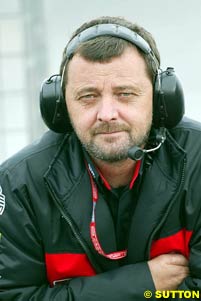 The problem has been Stoddart's fight to win the outstanding TV money left in the central pot when the Prost Formula One team left the Formula One scene at the beginning of the year. According to Stoddart, who was consistently backed up by sound legal opinion, once Prost folded, this money was due to Minardi. It is admittedly complicated as are most of the rules and regulations set out in the highly secretive Concorde Agreement, and of course where money was involved it was also bound to attract controversy, and sure enough it did.
The problem has been Stoddart's fight to win the outstanding TV money left in the central pot when the Prost Formula One team left the Formula One scene at the beginning of the year. According to Stoddart, who was consistently backed up by sound legal opinion, once Prost folded, this money was due to Minardi. It is admittedly complicated as are most of the rules and regulations set out in the highly secretive Concorde Agreement, and of course where money was involved it was also bound to attract controversy, and sure enough it did.
Paul Stoddart, 46 years old and a self-made millionaire and Chairman of European Aviation, is a man with little time for either politics or prevarication. A slim, slight man with a beard and endless nervous energy, he is a Doer with a capital D, and lets no man stand in his way. His bull in a china shop approach has had an interesting effect on the sensibilities of a highly political Paddock, where the hierarchy lie.
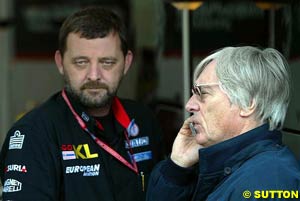 The rich teams expect respect and careful handling from the smaller teams, but Stoddart has just gone right in, cutting a swathe through "the political crap" as he calls it, and getting things done. This has earned him enemies and friends in about equal amounts, and there is no doubt that his personality has been crucial to the fact that the team is still afloat. In fact, his bullying tactics and brilliant manipulation of the media forced the powers that be to sit up and take notice
The rich teams expect respect and careful handling from the smaller teams, but Stoddart has just gone right in, cutting a swathe through "the political crap" as he calls it, and getting things done. This has earned him enemies and friends in about equal amounts, and there is no doubt that his personality has been crucial to the fact that the team is still afloat. In fact, his bullying tactics and brilliant manipulation of the media forced the powers that be to sit up and take notice
His dream of becoming a Formula One team owner finally came true when Stoddart purchased Minardi on Thursday, 18th January 2001, for $28 million with another $9 million of his own money just to keep the team afloat in 2001. In just over six weeks he got the team on the grid in Australia and he set about transforming his little part of the Kingdom into the friendliest team in the Paddock. He also set about making his mark.
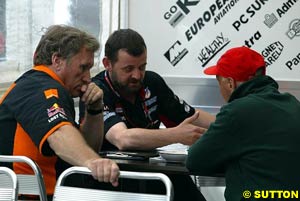 Minardi finished the 2001 season with nil points and therefore no claim to the $12 million TV money. To make matters worse, post-September 11 recession meant Minardi were lacking more money and more investors, and thus Stoddart's 2002 battle for survival began.
Minardi finished the 2001 season with nil points and therefore no claim to the $12 million TV money. To make matters worse, post-September 11 recession meant Minardi were lacking more money and more investors, and thus Stoddart's 2002 battle for survival began.
Stoddart finally received the money late last month. Financially, he won. But Stoddard also lost a lot in the process, and the price he paid for not going quietly is considerable.
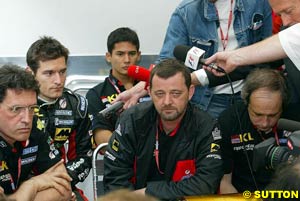 "The fight against the Phoenix issue took all my time and energy and as such I couldn't always keep my eye on the ball, and in addition to this my honesty in telling the media the truth and fronting up the problems cost me a lot in sponsorship terms," he now admits.
"The fight against the Phoenix issue took all my time and energy and as such I couldn't always keep my eye on the ball, and in addition to this my honesty in telling the media the truth and fronting up the problems cost me a lot in sponsorship terms," he now admits.
Sidebar: We'll Always Have Melbourne
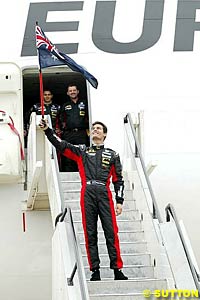 Minardi arrived at 8:00am on Sunday, 24th February, to a State Welcome with Victoria Premier Steve Bracks and Australian Grand Prix Corporation Chairman Ron Walker waiting for Stoddart and his plane on the runaway tarmac with a brass band. Stoddart was in the cockpit of the plane, flying the Australian flag. As they all disembarked, the band struck up 'Waltzing Matilda', and the Australian owned team knew they had come home.
Minardi arrived at 8:00am on Sunday, 24th February, to a State Welcome with Victoria Premier Steve Bracks and Australian Grand Prix Corporation Chairman Ron Walker waiting for Stoddart and his plane on the runaway tarmac with a brass band. Stoddart was in the cockpit of the plane, flying the Australian flag. As they all disembarked, the band struck up 'Waltzing Matilda', and the Australian owned team knew they had come home.
Please Contact Us for permission to republish this or any other material from Atlas F1.
|
Volume 8, Issue 29
Atlas F1 Exclusive
The Twelve Million Dollar Man
Interview with Ross Brawn
A Weekend with the Dennises
Articles
Giancarlo Fisichella: Through the Visor
Jo Ramirez: a Racing Man
French GP Preview
The French GP Preview
Local History: French GP
France Facts, Stats and Memoirs
Columns
The French & German GP Quiz
Bookworm Critique
Elsewhere in Racing
The Grapevine
> Homepage |